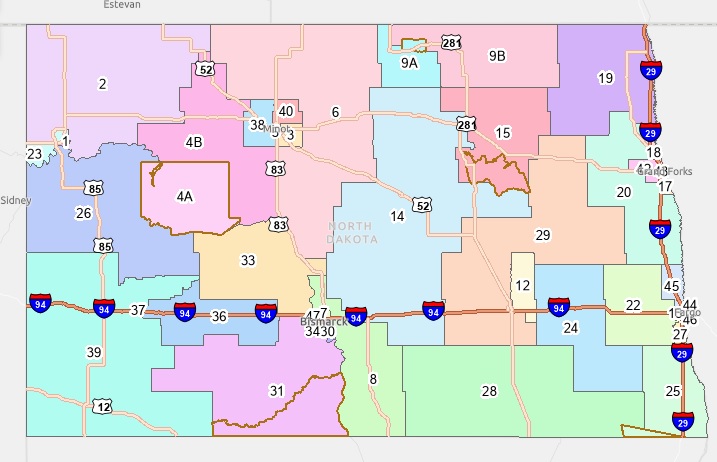BISMARCK, N.D. (CN) — A federal judge ruled Friday that North Dakota’s legislative redistricting plan violated the Voting Rights Act and weakened the voting power of two Native American tribes.
U.S. District Judge Peter Welte held that the redistricting move by the 2021 North Dakota Legislature violated Section 2 of the Voting Rights Act of 1965, which lays out a prohibition on the manipulation of district lines to dilute votes based on race. The decision is expected to lead to another special session of the Legislature to rectify the violation.
The judge wrote in the ruling that the redistricting under the latest census data “prevents Native American voters from having an equal opportunity to elect candidates of their choice.”
Welte, a Donald Trump appointee, gave the North Dakota Legislature and the secretary of state until Dec. 22 “to adopt a plan to remedy the violation.” The ruling also gives the Turtle Mountain Band of Chippewa and the Spirit Lake Tribe until Jan. 5, 2024, to raise objections to the new redistricting plan.
Once the terms of future redistricting are agreed upon, the amended voting districts will take effect in time for the November 2024 election.
The offending redistricting plan split the state into 47 districts. The Turtle Mountain Band of Chippewa took issue with two subdivided House districts around the Turtle Mountain Reservation and the Fort Berthold Reservation, which became districts 9A and 9B. The tribe the filed suit against the secretary of state in Feb. 2022.
The Spirit Lake Tribe tagged on to the Turtle Mountain in its lawsuit, claiming the plan stacked its tribal nation into District 15, a “majority-white district.”

“It is evident that, during the redistricting process, the Secretary and the Legislative Assembly sought input from the Tribes and other Native American representatives. It is also evident that the Secretary and the Legislative Assembly did carefully examine the VRA and believed that creating the subdistricts in district 9 and changing the boundaries of districts 9 and 15 would comply with the VRA,” Welte wrote in his 39-page opinion. “But unfortunately, as to districts 9 and 15, those efforts did not go far enough to comply with Section 2.”
Michael Carter, a Native American Rights Fund attorney who represented the tribes at trial in June, said that the state Legislature should have drawn a district that included both the Spirit Lake and Turtle Mountain reservations, giving them a majority Native American district.
However, Former Republican State Senator Ray Holmberg, a member of the redistricting committee at the time, said lawmakers believed it would be gerrymandering to pack Native Americans into a single district and that the committee was actively working to avoid a Section 2 violation.
Spirit Lake Tribe Chair Douglas Yankton Sr. weighed in on the impact the changes would cause when the suit was originally filed.
“Instead of creating fair boundaries as outlined in the Voting Rights Act, the map adopted by the North Dakota Legislature silences Native American voters on every issue, lowers the chance Native voters could elect a candidate they feel best represents their community, and prevents communities in these splintered districts from receiving a fair share of public resources,” Yankton said.
North Dakota’s 47 legislative districts are each composed of a senator and two representatives. Currently, the Republicans have an overwhelming majority in both the House of Representatives and the Senate.
The office of the North Dakota Secretary of State did not respond for comment by press time.
Subscribe to Closing Arguments
Sign up for new weekly newsletter Closing Arguments to get the latest about ongoing trials, major litigation and hot cases and rulings in courthouses around the U.S. and the world.








